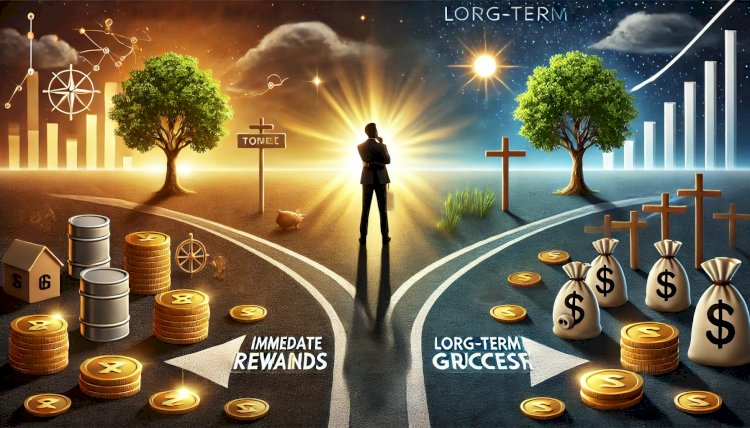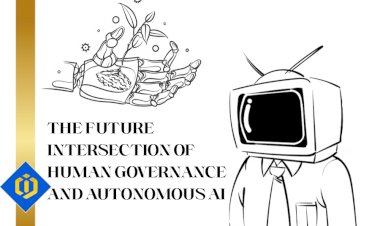Leading with Vision: How to Avoid the Pitfalls of Short-Minded Leadership

This article is originally published on A Land and written by Dr. Pooyan Ghamari, Swiss Visionary
In today's globalized world, wealth and influence are often mistakenly equated with intelligence and the ability to think strategically for the long term. However, many individuals in powerful positions tend to adopt a short-term perspective, making choices driven by immediate rewards rather than long-lasting success. This limited approach can introduce systemic risks, stifle innovation, and undermine those who seek to challenge established norms. For professionals, investors, and decision-makers who are focused on enduring success, it is essential to identify, navigate, and avoid the pitfalls associated with short-sighted leadership.
The Dangers of a Short-Term Mindset
A short-term thinker is someone who prioritizes quick satisfaction, personal gain, or political advantage over well-considered, long-term development. These individuals often:
- React Rather Than Plan – They chase immediate profits or temporary wins rather than building robust businesses, policies, or investments.
- Block Innovation – Their resistance to complexity and change leads them to reject new technologies, business models, or unconventional ideas.
- Promote Destructive Competition – Instead of fostering cooperation, they cultivate environments of hostility where only their own agenda prospers.
- Disregard Long-Term Impact – Decisions made without a focus on the future can lead to financial instability, market downturns, or a damaged reputation.
How They Bring Others Down
When individuals in powerful positions exhibit a short-term mindset, they can negatively impact those working under or alongside them. This occurs in several ways:
- Suppressing Dissent and Creativity: Many forward-thinking individuals find themselves at odds with such leaders because they present alternative solutions, challenge inefficiencies, or demand better governance.
- Financial and Operational Setbacks: Organizations driven by short-sighted decisions often suffer from poor risk management, rushed investments, and missed opportunities, leading to eventual failure.
- Manipulation and Reputation Damage: Those who refuse to conform to the short-term vision may be discredited, sidelined, or falsely accused, damaging their credibility and career.
A well-documented example is the 2008 financial crisis, where many financial institutions prioritized short-term profit through risky subprime mortgages, ignoring long-term economic stability. The collapse that followed proved how destructive this mindset can be on a global scale.
Escaping the Grip of Short-Minded Leaders
- Recognizing the Early Warning Signs
Avoiding the influence of short-minded individuals begins with identifying their behavioral patterns. Common red flags include:
- Lack of Future Planning – If someone always focuses on quarterly profits without discussing long-term vision, they are likely driven by short-term incentives.
- Resistance to Change – Innovation and adaptability are crucial for progress. Leaders who dismiss new technologies, economic shifts, or market trends are operating with tunnel vision.
- Fear-Based Leadership – Individuals who manipulate through fear, competition, or exclusivity create an unhealthy work and business environment.
- Over-Promising with No Substance – Leaders who make ambitious claimswithout a clear, structured plan to back them up are often setting the stage for future failures.
- Building a Resilient Network
- Surround Yourself with Strategic Thinkers – Align yourself with individuals and organizations that prioritize long-term goals, ethical leadership, and sustainable growth.
- Diversify Your Alliances – Avoid over-reliance on a single network, market, or decision-maker. Expanding into multiple industries, financial instruments, and geographical regions provides greater stability.
- Invest in Knowledge and Adaptability – Stay informed about economic trends, technological advancements, and shifting market dynamics to avoid being trapped by someone else’s short-sighted strategy.
- Creating Independence Through Strategic Positioning
- Control Your Own Narrative – In an environment where short-minded leaders manipulate information, controlling your brand, reputation, and communication strategy is crucial.
- Leverage Data and Insights – Make well-documented, data-driven decisions that offer clear value and long-term benefits, making it difficult for others to dismiss or undermine your ideas.
- Maintain Financial Independence – Many individuals fall under the influence of short-sighted leadership due to financial dependency. Ensuring multiple revenue streams, smart investments, and contingency planning can safeguard against external pressures.
Turning Their Weaknesses Into Your Advantage
Short-minded individuals typically fail to anticipate major shifts in the business, financial, or geopolitical landscape. You can use this weakness to:
- Anticipate Market Cycles – In investment and business, short-term thinkers often panic during downturns and over-leverage during booms. A long-term approach allows for strategic acquisitions, risk mitigation, and sustainable growth.
- Capitalize on Their Failures – Many short-sighted organizations ultimately collapse. Being prepared with strong positioning, alternative solutions, and the ability to step in when they fail can create immense opportunities.
- Be the Bridge Between Short-Term and Long-Term Thinking – Instead of outright conflict, some situations require patiently steering leadership toward sustainable decisions. If engagement is unavoidable, positioning yourself as the rational, data-backed voice of reason can increase influence.
Final Thoughts: Thriving in a World of Short-Sighted Decision-Makers
Surviving and succeeding in a world filled with short-term-minded leaders requires a strategic mindset, independent positioning, and a network of like-minded professionals. While their influence may be frustrating and obstructive, they are often predictable in their flaws.
By maintaining intellectual agility, financial resilience, and a deep understanding of market trends, you can outmaneuver, outperform, and outlast even the most powerful short-term thinkers. Ultimately, history favors those who plan for the future, not just the moment—and positioning yourself accordingly is the key to lasting success.
30 Most Important FAQs on Navigating and Avoiding Short-Minded Leadership
Understanding Short-Minded Leadership
- What is short-minded leadership?
Short-minded leadership refers to decision-making based on immediate gains rather than long-term sustainability. These leaders prioritize short-term profits, personal interests, or quick wins over innovation, ethical governance, and strategic planning.
- How does short-minded leadership impact businesses and organizations?
It leads to poor risk management, lack of innovation, employee dissatisfaction, and financial instability. Such businesses often face reputational damage and collapse over time.
- Why do short-minded people often gain power?
They usually excel at self-promotion, networking, and political maneuvering rather than strategic thinking. They may also appeal to investors or stakeholders looking for quick returns.
- Are short-term decisions always bad?
Not necessarily. Short-term agility is important in crisis management and market shifts, but it should always be balanced with a sustainable long-term strategy.
- How does short-term thinking affect industries and economies?
It creates economic volatility, market bubbles, and unsustainable growth cycles. This is seen in cases like the 2008 financial crisis, where short-term profit-seeking led to long-term economic disaster.
How Short-Minded People Bring Others Down
- How do short-minded leaders suppress innovation?
They resist new ideas, disruptive technologies, and strategic change due to fear of losing control or lack of understanding of future trends.
- What tactics do short-sighted leaders use to undermine others?
They engage in gaslighting, manipulation, false promises, favoritism, and spreading misinformation to weaken potential competitors.
- How do such leaders damage a company’s long-term success?
They often focus on cutting costs instead of investing in innovation, undervaluing employees, and ignoring future risks, leading to slow decline or sudden failure.
- Can short-minded leadership create legal and ethical risks?
Yes, negligence, regulatory violations, and unethical business practices often result from their focus on short-term profits over legal and social responsibility.
- Why do many businesses fail due to short-term decision-making?
Because they prioritize quick gains, short-term investor satisfaction, and artificial growth, neglecting sustainability and adaptability.
Avoiding the Negative Impact of Short-Minded Individuals
- How can I identify a short-minded leader early?
Look for lack of future planning, resistance to change, and an obsession with immediate profits over sustainable strategy.
- What should I do if my boss or CEO is short-minded?
Minimize dependence on them, document decisions, suggest strategic alternatives, and plan an exit strategy if necessary.
- How can employees protect themselves from short-minded leadership?
- Develop independent skills and networks
- Diversify career opportunities
- Stay informed about industry trends to avoid being stuck in a declining company
- Should I try to change a short-minded leader’s perspective?
It depends. Some leaders are open to data-driven arguments, but many resist change. If efforts fail, focus on positioning yourself for success elsewhere.
- How can I avoid short-minded investors or business partners?
Screen potential partners by evaluating their past investment behaviors, strategic vision, and willingness to commit to long-term goals.
Building Resilience Against Short-Minded Decision Makers
- How can I outmaneuver short-minded leaders?
- Think long-term while executing short-term wins
- Anticipate market shifts they ignore
- Build a strong reputation and independent brand
- What industries suffer the most from short-term thinking?
- Finance (e.g., speculative trading, quick IPOs, asset bubbles)
- Real estate (overleveraged developments)
- Technology (failure to invest in R&D, security risks)
- What strategies help avoid being dragged down by short-minded people?
- Financial independence
- Network with visionaries
- Own and control your narrative through branding and media
- How do short-minded individuals respond to long-term thinkers?
Often with resistance, skepticism, or direct opposition. They may view long-term thinkers as threats to their control.
- What is the biggest weakness of short-minded individuals?
They fail to anticipate change, making them vulnerable to market shifts, economic downturns, and strategic competitors.
Turning the Situation to Your Advantage
- How can I capitalize on short-minded decision-makers?
- Predict their failures and prepare alternatives
- Invest in industries or assets undervalued due to short-term mismanagement
- Step in as a leader when their strategies fail
- What role does patience play in dealing with short-minded people?
Patience allows long-term thinkers to outlast and outperform short-sighted competitors over time.
- Can short-minded leadership be leveraged for personal gain?
Yes, by offering solutions to their blind spots, investing where they fail, or using their impulsiveness to create better deals.
- How does strategic positioning help in dealing with such people?
By maintaining a long-term vision, independent financial resources, and diversified relationships, you become resilient against their unpredictability.
- How can I protect my business from the influence of short-sighted investors?
- Retain majority control over key decisions
- Avoid taking funding that compromises your vision
- Ensure strong contractual protections
Long-Term Thinking and Sustainable Success
- What traits define a successful long-term thinker?
- Strategic foresight
- Patience and adaptability
- Willingness to invest in innovation and people
- How can I balance short-term wins with long-term vision?
By using quick revenue strategies (short-term) to fund research, branding, and expansion (long-term).
- What companies have failed due to short-minded leadership?
Examples include WeWork, Kodak, and Blockbuster, all of which ignored long-term shifts in their industries.
- What industries require long-term thinking the most?
- Technology (AI, blockchain, cybersecurity)
- Sustainable energy (green investments, EVs)
- Finance (long-term wealth strategies vs. speculation)
- What is the ultimate takeaway for avoiding short-minded leaders?
The key is to anticipate their failures, maintain independent positioning, and stay adaptable in a changing world. Long-term success always outperforms short-term gains, provided you have the patience, resilience, and strategic vision to sustain it.
Final Thought
Short-minded leadership creates temporary advantages but long-term instability. Recognizing and avoiding its pitfalls is critical for investors, professionals, and businesses seeking lasting success. By understanding their weaknesses and maintaining strategic independence, you can thrive even in environments dominated by short-sighted decision-makers.

 content-team
content-team 


















